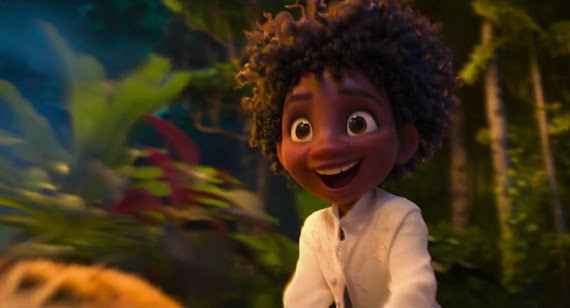Yesterday I was talking about how one of the strengths of the first half of the final season of OZARK is the big bold choices that it gives Jonah, and how those choices end up making us understand him and root for him and also draw out bigger, bolder versions of the other characters as well.
There is one proviso in this way of thinking about character, as far as I can tell. And that is that the big, bold choices need to be justified in some way. Another way of putting it is, they need to be grounded in who the character is and our history with them. Wendy can make the incredible leap of deciding to try and set Jonah up because we've walked with her for three years and seen what she is capable of to protect her interests. Also--and I think this is equally important--the early part of the new season gave us moments where on her own she was struggling to deal with what she had done to Ben. Jonah throwing that in her face is allowed a different level of reaction given what we know is going on with her in private.
Similarly Ruth's mid-season decision to basically kill everyone (it's the cartel now, but let's just wait and see) is absolutely justified by the fact that her most fundamental drive the entire show has been to protect Wyatt (and also Three, sort of). With him murdered all bets are definitely off when it comes to what Ruth is capable of.
(At this point I'm rooting for her, Jonah and Charlotte to get away while everyone else lies bleeding out. And honestly, I suspect that's Marty's hope too.)
OZARK loves a good crazy character. And when those characters' craziness is justified, it's all good. But usually there's at least one character that is just plain insane. Darlene in the early going, who said she would do everything in her power to stop the cartel from encroaching on their business and then just keeps creating the circumstances that led to their problems with the cartel. We also had the FBI agent chasing Marty and Wendy and the cartel, who once again kept doing insanely self-destructive things.
This season we've introduced two wholly new characters who are once again batshit crazy in one way or another. We've got Javi, who wants to run the cartel, who once again does just ridiculous things for no good or smart reason, like killing the sheriff or persistently getting in the way of the very drug sales he insists on running. And we've got Detective Rando, who says he's just here to find out what happened to Helen but is clearly there from a story point of view to fuck with everyone and everything.
Part of the problem with these characters is they're both brand new this season. There is no history within which to ground their big, bold choices. This is especially true with the detective, who comes so totally out of left field. It's very hard in the late innings to justify adding someone that has nothing to do with the ongoing story. It just smacks of writer convenience. A hotheaded young drug dealer who is related to Navarro at least fits into the world of the show. And the show tries to ground some of his craziness in the fact that he seems to have loved Helen and thought Navarro should have killed the Byrdes instead. It doesn't totally work; we've just seen the show pull the Here's a New Crazy Person magic trick too many times. But it's an attempt.
But the bigger issue is always do the choices seem justified? Do they factor into the characters' desires and interests? And also, how do others deal with the choices? Javi makes a ton of mess and he's never in danger of getting killed by Navarro. That doesn't make sense. It doesn't square with Navarro and more than that it just feels really convenient. Big bold choices that don't create new problems for that character, that aren't genuinely risky, are not actually bold choices at all. They're just obstacles the writers want to set for the main characters.
Which I get--that's the writer's job, after all. Get the characters up a tree and then throw everything you can at them. But the magic trick is to do that without letting the audience see that's what you're doing. And that's all about justifying choices in the life and intentions of the antagonists doing the throwing.
(By the way, OZARK has plenty of characters and situations who are great examples of doing this well. Maya's choices in the finale are a case in point. The FBI fucks with her, and she's been completely uncomfortable all along, so she decides to blow the whole thing up and live by her own moral code. It's shocking and enormously risky for the Byrdes, but also for her. And it builds pretty naturally from what we've seen of her relationship with this case and also the FBI.)












